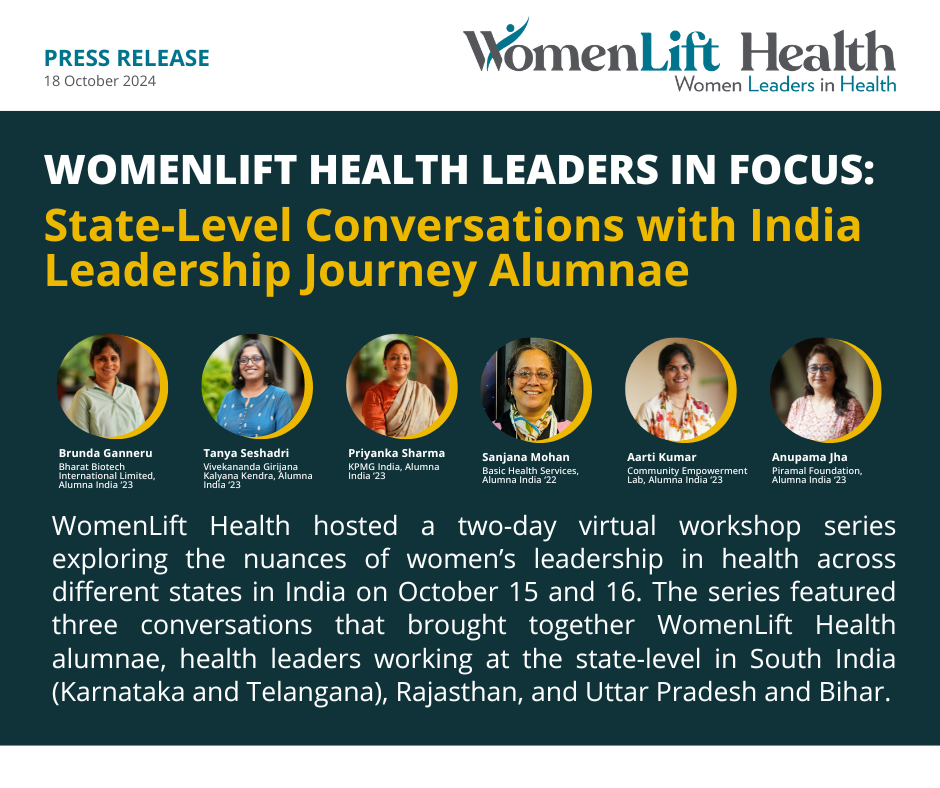New Delhi, October 17, 2024 — WomenLift Health hosted a two-day virtual workshop series exploring the nuances of women’s leadership in health across different states in India on October 15 and 16. The series featured three conversations that brought together WomenLift Health alumnae, health leaders working at the state-level in South India (Karnataka and Telangana), Rajasthan, and Uttar Pradesh and Bihar, respectively. The conversations explored varying norms that mould perceptions of leadership across states in the country, including hierarchical structures, family responsibilities, and other barriers to women’s participation in the workforce.
The sessions also explored challenges faced by women at the mid-career level—research by WomenLift Health and partners shows that overt and implicit biases against women in patriarchal and traditionally hierarchical work cultures, challenges of balancing family and professional responsibilities, and lack of female role models or mentors often act as barriers to women’s career progression at a stage when they are likely to drop out of the workforce. The conversations explored how structured leadership development programmes, access to mentorship, coaching, and a robust peer network, and tools and strategies to cultivate authentic, inclusive, strategic, and impactful leadership skills can provide the crucial support that women need at this pivotal stage.
“At WomenLift Health we are reimagining leadership by enabling women leaders to create a harmony between work, self, family and community, that allows them to be authentic, inclusive, strategic and impactful. Our goal is to enable the creation of a critical mass of women leaders who will drive gender equality and better health outcomes in India and globally,” remarked Ayesha Chaudhary, India Director, WomenLift Health.
On the contextual realities of South India, Tanya Seshadri, Director, Tribal Health Resource Centre at Vivekananda Girijana Kalyana Kendra, remarked, “In South India, we see more women out in the health space, but gender plays out very differently as you go higher in the leadership ladder. The few women in the leadership roles have only seen a particular style of leadership—a traditional, rigid, masculine style that can make workspaces feel like somewhere we do not belong.” Brunda Ganneru, Team Lead, Developmental Quality Control, Biology at Bharat Biotech International Limited, highlighted the double burden of managing work and family and how the Leadership Journey supported her through it, “The Journey helped bring in greater self-awareness through self-assessment tools that provided strategies or practices that can help create a work-life balance.”
Reflecting on her work in Rajasthan, Sanjana Brahmawar Mohan, Director of Basic Health Services, highlighted the challenges women face both as deliverers and receivers of healthcare “Women have very little voice or control over themselves. A woman may be very sick but will not be able to go and seek care because the families don’t consider it important enough. She continues to suffer. ASHAs and Nurses have very little voice too—they have no say on how their day goes.”
Along with prevailing social norms that restrict women in the state, Priyanka Sharma, State PMU Lead, KPMG, noted that even mindsets are often a crucial factor that must be addressed in a structured manner, “Mentorship and coaching form pertinent parts of the Leadership Journey. By talking to the coach, I could hear myself and understand what I really think, to make my own plans.”
During the session focusing on Uttar Pradesh and Bihar, Anupama Jha, Programme Director, Leadership Development, Piramal Foundation noted how Bihar’s deeply rooted patriarchal norms inform perceptions of leadership in the state, “It is very difficult for male counterparts to acknowledge your position. I’ve had a lot of strong allies, but it takes a lot of effort to accept a woman as a leader.” Aarti Kumar, CEO, Community Empowerment Lab, reflected on the need for strong community networks among women leaders, “The Leadership Journey by WomenLift Health gives a platform to build relationships—nurturing truly deep relationships that would last a lifetime.”
The sessions were attended by prospective applicants of the forthcoming 2025 India Leadership Journey: mid-career women working in public health across states in India. The India Leadership Journey is the organisation’s flagship leadership development experience designed to expand the voice and influence of mid-career women leaders in health. Applications are open until October 25.
__________________________________________________
About India Leadership Journey
WomenLift Health’s flagship India Leadership Journey is a leadership development experience designed to enhance the power and influence of emerging women leaders tackling complex public health challenges in the country. WomenLift Health is currently accepting applications for the forthcoming 2025 India Leadership Journey until October 25, 2024. Learn more and apply: https://bit.ly/ILJapply
About WomenLift Health
Established in 2019, WomenLift Health is committed to expanding the power and influence of talented women in global health and catalysing systemic change to achieve gender equality in leadership. With Hubs in North America, South Asia, East Africa, Southern Africa, and with prospects of further expansion into other regions, WomenLift Health envisions a world where diverse, accomplished leaders collectively transform health outcomes. Our work in advancing equality in health leadership is delivered through a range of actions at the individual, institutional, and societal levels. This includes our signature ‘Leadership Journey,’ which focuses on equipping mid-career women with tools, resources, along with peer, mentor and coaching support, to successfully use their voice, expertise and leadership for impact.


